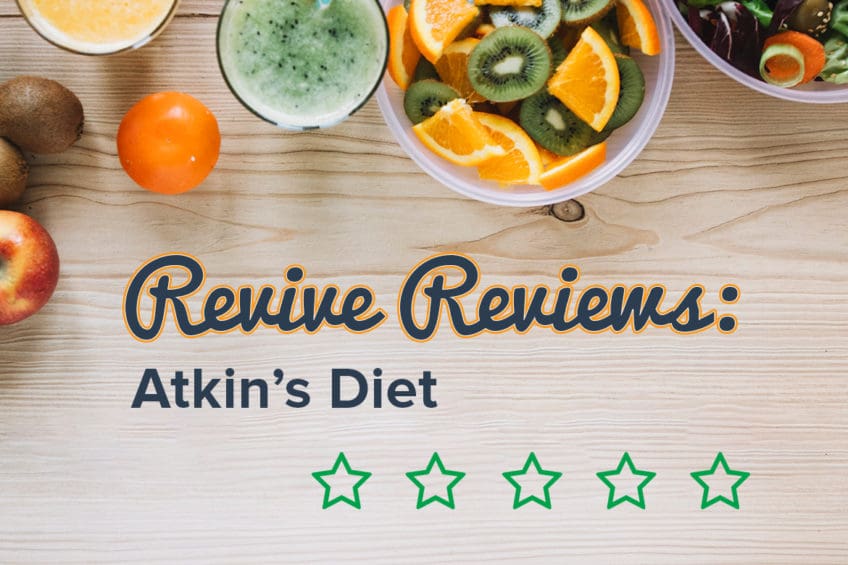Revive Reviews: The Atkin’s Diet
Atkins caters to the well-established myth that you must avoid carbohydrates if you want to lose weight. The Atkins diet is a high protein, low carbohydrate program consisting of 4 phases. The first phase dictates an extremely low carbohydrate diet with a mere 20 grams allowed each day (their new book outlines a 12-week meal plan that allows 20-80 grams)
Even after completing the four phases of the Atkins diet you may have to consume less than 130 grams of carbohydrates each day to maintain your “Atkins carbohydrate equilibrium” (ie. your new weight.) A multi-vitamin supplement is also recommended to replace nutrients lost from avoiding carbohydrate rich foods like dairy, whole grains, vegetables and fruits. A multi-mineral supplement is recommended to treat unpleasant symptoms like muscle weakness, dizziness, or fatigue. It is warned that this diet is not suitable for Individuals with compromised kidney function, or those who have type I or type II diabetes.
Cost:
By following recipes posted on the Atkins website throughout the four phases of the diet will result in an average weekly grocery bill of roughly $100 for one person. This is without purchasing the book “The New Atkins for a New You: The Ultimate Diet for Shedding Weight and Looking Great,” for a cost of $16. The website also advertises “Atkins high-fiber, low-carb bars, shakes” and other food items, that are available for purchase online or in many grocery stores for $5 to $15 per item. To complete the program however you do not need to purchase the book or food products.
Pros: The reported benefits of following this diet are associated with the initial weight-loss that helps prevent or treat conditions like diabetes, metabolic syndrome, and high blood pressure. However, this is only shown in the short term.
Cons: Following this diet will require drastically cutting down on carbohydrate and nutrient- rich foods like grains, dairy, fruits, starchy vegetables, and legumes. While you may achieve short-term satisfaction with initial weight loss (which is mostly loss of water weight and lean muscle mass), it is difficult and impractical to keep up in the long term. The only acceptable foods in the first phase are meat, poultry, fish, eggs, butter and a few ounces of cheese. This phase can be very damaging, as the human brain requires 130 grams of carbohydrate each day to maintain normal function. This type of restrictive dieting does result in short term weight loss for the simple reason that it is restricts calories, and triggers your brain and body into starvation.
In the long run, the combination of low fiber intake from not eating enough of vegetables and fruit and a high intake of saturated fat and cholesterol from eating only animal-based protein, raises your risk of heart disease, stoke and heart attack. It is very interesting an ironic to note that Dr. Robert Atkins, who created this diet, suffered from a heart attack at 71 years of age.
Would a Dietitian follow this diet?
One reason we would not follow Atkins is that it truly is a diet. As you can see from the amounts of foods “allowed/not allowed”, meal planning is difficult as well as time consuming. This would result in increased stress around meal time and therefore it would not be manageable for long periods of time. They key to successful weight management is creating sustainable lifestyle changes, this diet is too restrictive to be sustained for the rest of one’s life. Further, research has shown following a low carbohydrate diet does not result in higher weight loss long term than following a normal carbohydrate diet.
Ready to Ditch the Diet for Good?Revive Wellness is a team of passionate and evidence-based Registered Dietitians specialized in nutrition and wellness coaching for the Edmonton area.

